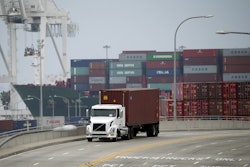WASHINGTON (AP) — Orders to U.S. factories for long-lasting manufactured goods fell in June by the largest amount in nearly two years, reflecting a big decline in the volatile category of commercial aircraft and broad weakness across a number of other areas. The key category that tracks business investment eked out a small gain.
Demand for durable goods dropped 4 percent in June, the biggest setback since an 18.4 percent drop in August 2014, the Commerce Department reported Wednesday. Excluding the volatile transportation area, orders would have still been down but by a smaller 0.5 percent.
The new report was weaker than analysts had been expecting and indicates manufacturing remains under stress from weak global demand and a strong dollar.
"It is a tale of two economies," said Chris Rupkey, chief financial economist at MUFG Union Bank. "Consumer expenditures are strong with the economy at full employment but companies are pulling back as the strong dollar and slower world growth are taking a toll on exports."
The orders report prompted some analysts to lower their forecasts for overall growth in the April-June quarter. Economists at Barclays Research trimmed their forecast to 2.3 percent growth, down from 2.4 percent.
June's result was led by a 58.8 percent plunge in orders for commercial aircraft.
Demand in a closely watched category that serves as a proxy for business investment plans edged up a slight 0.2 percent after two months of declines. This category has shown monthly increases only three times so this year. Orders in the investment category through the first half of this year are down 3.8 percent compared to the same period a year ago.
American manufacturers are struggling with a strong dollar, which makes U.S. products more expensive on foreign markets, and a sluggish global economy. Concerns about a slowing Chinese economy roiled financial markets at the beginning of the year. Markets were again sent into a brief tailspin following the June 23 vote in Britain to leave the European Union.
The 4 percent decline in orders in June followed a 2.8 percent drop in May and a 3.2 percent rise in April.
For June, one of the few areas of strength was autos and auto parts, which increased 2.6 percent. Orders for primary metals such as steel, computers and machinery all declined.


















